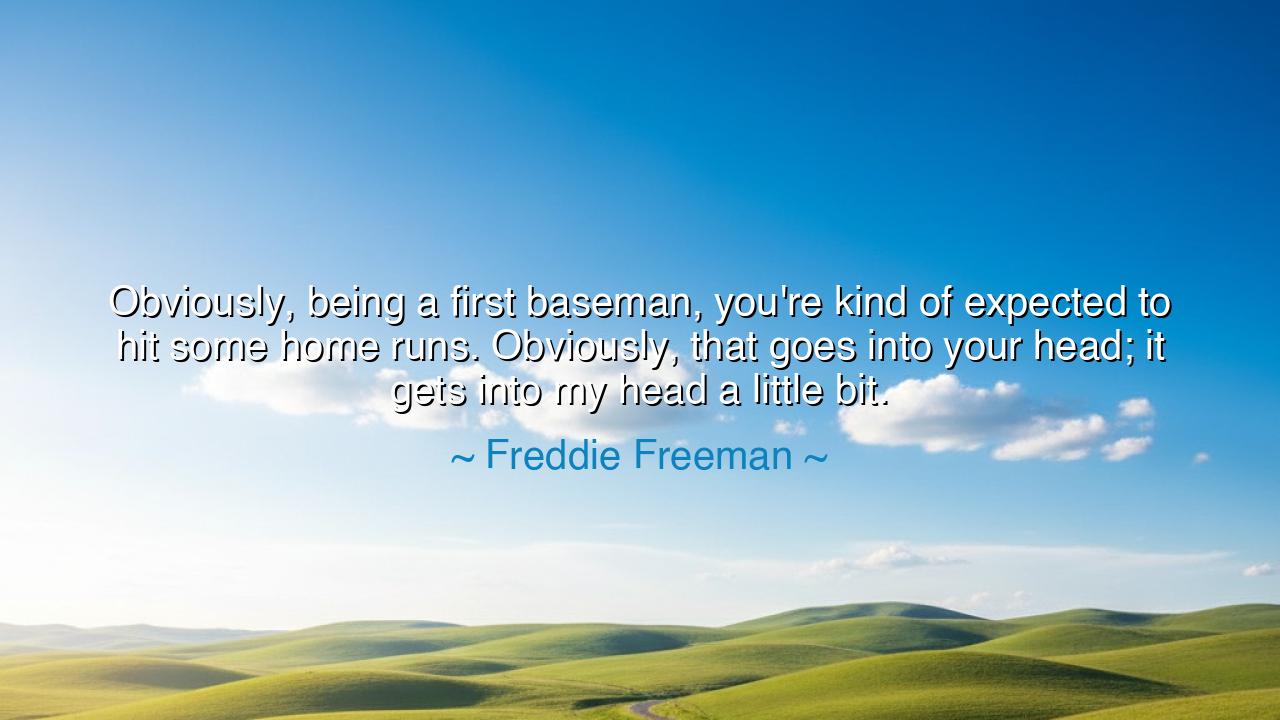
Obviously, being a first baseman, you're kind of expected to hit
Obviously, being a first baseman, you're kind of expected to hit some home runs. Obviously, that goes into your head; it gets into my head a little bit.






In the humble and reflective words of Freddie Freeman, we hear a truth that transcends the ballpark and reaches into the heart of every human struggle: “Obviously, being a first baseman, you’re kind of expected to hit some home runs. Obviously, that goes into your head; it gets into my head a little bit.” What at first seems like a simple reflection on sport reveals a profound meditation on expectation, pressure, and the eternal battle between outer duty and inner peace. Freeman speaks not only for athletes, but for all who live under the gaze of others — for all who must carry both the weight of their role and the quiet burden of their own humanity.
To be a first baseman is not merely to play a position; it is to embody an ideal. The game, like life itself, assigns each person a place, a role, and a set of expectations. For some, it is to lead; for others, to support; for others still, to deliver in moments of need. Yet within every role lies the invisible weight of expectation — the voice of the crowd, the whisper of comparison, the shadow of failure. When Freeman admits that these thoughts “get into his head,” he speaks with the honesty of one who knows that even the strong are not immune to doubt. This is the eternal condition of all who strive for excellence: to stand at the edge of performance, balancing between confidence and pressure, between one’s own rhythm and the world’s demands.
The ancients understood this struggle well. The philosopher Marcus Aurelius, emperor of Rome, wrote often about the tension between duty and peace. Surrounded by expectation, he reminded himself daily to focus not on what others thought of him, but on what was right and true within. “The obstacle is the way,” he said — meaning that the very pressures that burden us are the ones that refine us. In the same spirit, Freddie Freeman’s confession of inner pressure is not weakness, but awareness. For only those who acknowledge the storm can learn to walk calmly within it.
Consider, too, the story of Achilles, the great warrior of Homer’s Iliad. He was expected to be unmatched in battle, the savior of his people, the slayer of Troy’s mightiest defenders. And yet, beneath the armor, Achilles wrestled with pride, grief, and the heavy knowledge that he could never truly live up to both glory and peace. His life was marked by the very tension Freeman describes — the pull between the expectations of greatness and the private voice that asks, “Am I enough?” Every person who dares to perform before others — whether on a field, a stage, or in life itself — carries a piece of Achilles’ soul.
The origin of Freeman’s quote lies not in triumph, but in honesty. He does not boast of perfection or shrug off pressure; instead, he reveals what it means to bear expectation with grace. The home run — that symbol of perfection in baseball — is more than a feat of strength; it is a metaphor for the ideals we chase in life. The desire to deliver, to succeed, to rise to the moment — these are noble impulses. But when they consume the mind, they can become chains. Freeman’s humility reminds us that even those at the highest levels of mastery must return, again and again, to balance, to the inner stillness that allows true greatness to emerge.
There is wisdom, too, in his repetition of the word “obviously.” It is the voice of the world speaking through him — the chorus of assumption that follows all who stand in the light. “Obviously, you’re expected to hit home runs.” So too do we hear it in our own lives: “Obviously, you should succeed; obviously, you should be perfect.” And yet, the soul whispers in reply, “I am human.” It is this dialogue — between the external demand and the internal truth — that defines the mature spirit. The wise do not silence the world’s expectations; they acknowledge them, let them pass through, and return to the deeper purpose behind their work.
Let this be the lesson: expectation is the weight that shapes strength, but not the measure of worth. The one who strives under pressure must learn, as Freddie Freeman has, to let the game into his head without letting it rule his heart. The goal is not to escape pressure, but to transform it — to turn the noise of demand into the rhythm of discipline. When we learn to act not for applause, but for the love of the craft itself, we find freedom even under the heaviest weight.
Action to take: in your own life, when the world’s expectations press upon you, pause and remember the first baseman’s truth. You stand in your own arena, under your own lights. The crowd may demand their home runs, but your duty is only to give your best swing — steady, focused, and true. Let your effort be your measure, not the praise that follows. For in the end, as every wise player knows, perfection is fleeting, but integrity under pressure endures forever.






AAdministratorAdministrator
Welcome, honored guests. Please leave a comment, we will respond soon